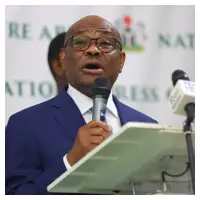Economist and Financial Derivatives CEO Bismark Rewane has described Nigeria's economic performance under President Bola Tinubu's first two years as "less than satisfactory in practical terms," despite some positive indicators.
Speaking during a Channels Television interview on Thursday, Rewane offered a nuanced assessment of the administration's economic policies, suggesting a disconnect between theoretical progress and tangible benefits for citizens.
"In terms of theory, Nigeria has been satisfactory regarding policy announcements. In terms of practicality, Nigeria is less than satisfactory in terms of delivery," Rewane stated.
Mixed Economic Indicators
According to Rewane, the administration has achieved several positive economic indicators, including a 3.6 percent GDP growth rate, increased government revenue, improved crude oil production, a favorable balance of trade, and stable external reserves at $38 billion.
However, he highlighted significant challenges that continue to affect ordinary Nigerians, including elevated inflation, high government debt (now at N166.71 trillion), declining per capita income, and a rising cost of living.
"Unfortunately, even though the economy as a whole is doing better, the impact and the distribution of wealth and opportunities are not corresponding with the increase in growth. The increase has not shown that people are better off," he explained.
Call for Tangible Results
Rewane emphasized that the government needs to focus on translating its economic policies into concrete improvements in citizens' lives.
"The difficult part is translating these policies into tangible results that make people happier tomorrow than they were yesterday," he advised.
The economist's assessment comes as President Tinubu marked his second anniversary in office. In his anniversary statement, Tinubu acknowledged the challenges of rising living costs but maintained that his administration has "made undeniable progress."
The President pointed to Nigeria's inflation rate of 23.71 percent in April 2025, which he described as declining, and highlighted that the country achieved over N6 trillion in revenue in the first quarter of 2025 alone.
Rewane's evaluation offers a reality check on the administration's economic performance, suggesting that while macroeconomic indicators may show improvement, many Nigerians have yet to experience meaningful benefits in their daily lives.













